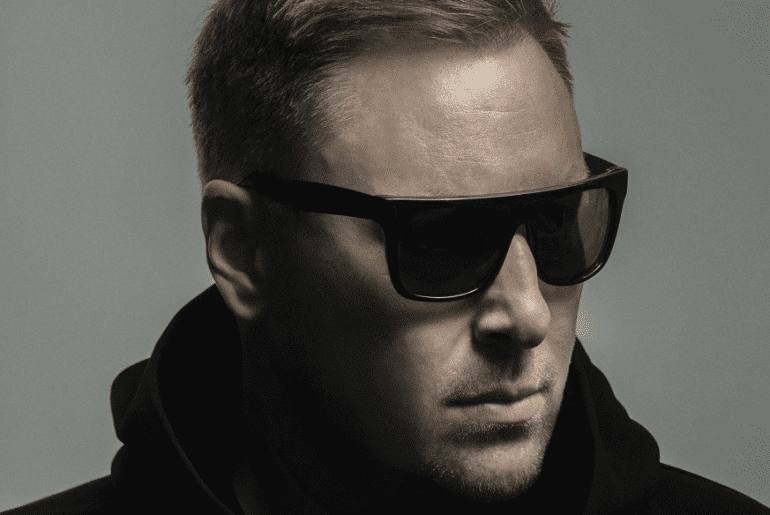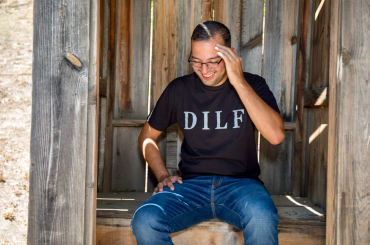No matter the circumstances, Uroš Umek is not a man who ever fully slows down. It’s true that the COVID situation has made the popular Slovenian DJ/producer ease up on his global travels, but, unlike many, he’s managed to pivot gracefully toward several other career-enhancing endeavors.
As one of the world’s top techno talents, Umek (as he’s known professionally) has built a brand most DJs would envy. Deeply involved in music since the early ‘90s, Umek learned DJing and production the old-school way – with vinyl and hardware, respectively. Over time, he unleashed his talents to Europe’s techno-loving masses, ultimately cultivating a dark, driving, peak-hour techno sound. In addition to achieving his dream as an in-demand DJ at major clubs and festivals, Umek became a top label owner with his 1605 imprint, and one of the scene’s most-downloaded techno artists.
The discography is daunting, but its highlights remain thrilling. They include techno bombs like 2002’s cinematic spine-tingler “Gatex,” 2011’s warped banger “Beograd,” and 2018’s dark monster “Amnesiac.” More recent winners from 2020, like “Predator” and “Evolution” (a menacing collab with France’s Cosmic Boys), are joined by worthy remixes of a pair of 1995 rave classics – Union Jack’s acid-trance “Red Herring” and Yves DeRuyter’s anthemic “Calling Earth.”
Apart from his 2020 studio work and label A&R duties, Umek worked through the lockdown by live-streaming, creating sample packs and helping up-and-coming DJ/producers with one-on-one online production classes. We recently caught up with Umek from his home in Central Europe – Ljubljana, Slovenia, in the former Yugoslavia, to be exact – to get some of his unique history and find out how he pivoted through the pandemic.
DJ Times: When you began your musical journey, what were your principal inspirations?
Umek: As a young teenager, I noticed there are guys who play music at school dances, and over the years I’ve started noticing them more and more. I watched what they did and how they did it, and became more and more intrigued in doing the same myself.
DJ Times: Beyond the school-party scene, what else were you experiencing? How did you get into DJing?
Umek: I became a high-school freshman when the rave wave hit Slovenia in the early ’90s. I got instantly hooked on this new electronic music and wanted to present it to others. It took some time for me to learn how to mix music on turntables and get a chance to perform in a proper club. But once I did it, I decided I was in it for real. Shortly after this, I went to a big indoor rave in Munich, where Carl Cox was playing, and that is when I got inspired to try and become an international DJ.
DJ Times: So how did you go about it?
Umek: I grew up in a one-parent household and made a deal with my mother to take a year off school to try DJing professionally. I dropped out of school and ditched a promising career as a basketball player in order to dedicate all efforts into achieving my goal of becoming a DJ. I had just been called up for Slovenia’s national team – a couple of guys from that team actually became NBA and Euro League champions. Anyway, after one year, I had made it to the point where I earned enough, as a DJ, to cover all my living expenses.
DJ Times: And then you transitioned into actually making music?
Umek: Yes, shortly after that I started producing. I wanted to know how music was made, and I wanted to play some of my own music in my DJ sets. I guess that’s something most DJs try at some point in their careers. I got in touch with a guy who had the equipment and he taught me the basics of music production. From that point on, I started accumulating knowledge and focused more on producing. It took me quite some time to get signed on Slovenian labels, but not long after that [in 1996-97], I got picked up by a couple of very influential techno labels that really liked my sound.
DJ Times: What made the difference?
Umek: I guess I had quite an original style, because I learnt everything from scratch, with scarce knowledge and very basic equipment. But making all the mistakes along the way made me stand out and apparently DJs wanted to play my music.
DJ Times: What reflections do you have of that time?
Umek: Looking back, it was a slow progress, as Slovenia was a post-communist country. There was no internet, no music infrastructure and all resources for information were very limited. But I would never trade that in for the current situation, when everything is available to anyone.
DJ Times: Back then, the rave scene almost felt like you were in a secret community. Plus, DJs had to learn the basics of spinning vinyl and, in the studio, working with hardware. DJs had to be hands-on in very different ways.
Umek: It was fun doing something new on our own and helping build the scene as we went along. Looking at instantly famous young artists of today and their lives, I am not sure it’s healthy to break through overnight. Progressing step-by-step might be frustrating sometimes, but that makes you a stronger, better, and tougher artist/person. When I look back over my personal journey, I’m happy I did it my way, as I have a lot to show, and I can see how I’ve influenced the audience, including new generations of artists, especially in my home region.
DJ Times: In Slovenia, what’s the DJ/club scene like during normal times?
Umek: Let’s say it is very boutique. Slovenia used to be a trend-setter in the region, but that got lost over the last couple of years. With the closing of our iconic Ambasada Gavioli [in Izola], we have completely lost the super-club scene. The legendary Klub K4 and a couple of promoters are still trying to keep pace with international underground electronic movements, though.
DJ Times: And festivals?
Umek: We also have two major electronic music festivals called Smile and StellarBeat that host top international DJs for crowds of up to 20,000. We also have a strong series of major indoor pop-up events called Kurzschluss that often host up to 4,000 people – they’re now running for half of a decade. But, to be honest, other areas such as Zagreb and Belgrade have completely outrun Ljubljana in the last couple of years, and the Croatian seaside is one of the hottest international festival playgrounds during the summer. A lot of Slovenian companies, artists, and other professionals are now involved in putting together major festivals in Croatia.
DJ Times: What’s your DJ set-up?
Umek: After performing on a laptop set-up for almost a decade, I’ve turned back to Pioneer CDJs at the end of last year. Now I play on Pioneer CDJ-2000NXS2 units and a DJM mixer setup. Mostly, it’s because it’s way easier to travel around the world with less equipment. At the same time, the progress in CDJs and mixer technology in the last couple of years means they now cater sufficiently to my creative needs.
DJ Times: And in the studio, what’s the main set-up?
Umek: I’ve actually sold most of my hardware a while ago, and only kept a couple of pieces because of their sentimental value. My studio set-up is based on a laptop, RME sound card and a quality Quested monitoring system in a soundproofed room located at the basement of my home. My current sound was developed in Logic with heaps of soft synths, other plug-ins and samples.
DJ Times: Anything special that helps you get unique sounds?
Umek: My weapons of choice are FabFilter’s Saturn and Soundtoys’ Decapitator, as they are great for distortion and saturation, and I used them to add the final touch to all my tracks released in least last two years, including about a dozen of Beatport top-sellers and chart-toppers. I use saturation on almost all my sounds, everything from synths and samples to hi-hats. That’s what I do to help get a thick and chunky sound.
DJ Times: What’s the past year it been like in Ljubljana?
Umek: Like in most countries, public life stopped in Slovenia in early March. Since then, the clubs here have been closed. During the summer months, there was only some heavily regulated concerts with no more than 500 capacity allowed. At the peak of the first wave, we were limited to only stay in our local area, which meant, in my case, I could not move outside of Ljubljana city limits. Slovenia is a very green country, so at least there are plenty of parks, woods and fields to walk in and get fresh air. To be honest, apart from gigs and traveling, my life did not actually change that much. A lot of DJs are quite introverted, and happily spent a lot of time locked in our studios… often it is somewhat of a self-imposed quarantine.
DJ Times: How did you cope?
Umek: By the fall, things were getting better, but then we stopped public life again. Traveling around the country was limited and all the restaurants, bars, fitness studios, etc., began closing again. But it wasn’t all bad, because for the first time in my life I got to spend three months off, and spent that time on the beautiful isle of Hvar in Croatia, as my wife, Senka, runs a popular beach bar there.
DJ Times: How did the pandemic affect your gig schedule and other work?
Umek: We had a nice summer tour planned with lots of big festival appearances, but due to the pandemic I have not performed live since early March. I have been busy in the studio, but the income from selling music has fallen also – clubs not being open means DJs are buying less music.
DJ Times: Nonetheless, it seems like you were very busy in the studio.
Umek: Yes, with lots of releases. I recently released my remix of Union Jack’s “Red Herring.” In the last few months, I put out my remix of Yves DeRuyter’s classic anthem “Calling Earth” and that finally came out. That is one of the tracks from my DJ sets that people have been going wild for and many have been asking me when it’s coming out for almost a year now. That finally arrived! I’ve also released my own EP on 1605, plus two new EPs from Cosmic Boys and Space 92 together with the fourth instalment of “1605 Desiderati” VA series, this time with contributions by Loco & Jam, rising Australian artist Mha Iri, Teenage Mutants and Space 92.
DJ Times: Given the constraints of the pandemic, were you happy with your musical output in 2020?
Umek: I’m actually quite satisfied with my own music, and the tracks signed to my label, 1605. I’ve worked really hard to get the label noticed by the industry, and it’s had quite an output of releases during 2020. It looks like gigs are not happening in the near future, so there certainly won’t be any shortage of releases, as I’m filling my time listening to demos and making my own tracks.
DJ Times: How else have you constructively filled your time?
Umek: I’ve started doing one-on-one online courses [for SonicAcademy.com] with young producers, where I’m sharing my knowledge and production skills. I quickly realized this is something I really like doing, so I’ll continue even when life gets back on track. When I am playing gigs again, I probably won’t have the time to tutor as many artists as I am now, but I’ll keep doing it to some extent. It’s rewarding to see how talented artists are advancing through this process of coaching. As their sound becomes better, it’s great to see them become satisfied with their newly obtained skills and confidence. I’m linked to helping others with their music.
DJ Times: What’s the main hurdle for younger DJs who want to make music?
Umek: I tutor producers with very different levels of knowledge, experience, and skills. With newbies, we have to start at the basics, which nowadays everybody should be able to conquer. Students start working at very different levels and I try to guide them on their path. We talk a lot about their career goals and how to create their own sound. Even when a young artist knows what he wants, and he can deliver an interesting sound, it’s hard to get noticed by the scene. However, that’s a different struggle, I’m here to teach them mostly about production and how to create quality music. On the other hand, I also work with artists who’ve already made their name in the scene and would like to fine-tune some elements in their sound. Working with them is a different experience, as they are much more skilful. Thus, we work on the tiniest details in their production, which gets much more technical.
DJ Times: You’ve also gotten back into making sample packs…
Umek: I have finally had time to put together my new sample pack – “Techno Foundations” for Loopmasters. It has got a load of parts that I use as the foundation of tracks, and it’s great for beginners or experienced producers who are looking for some new inspiration. There are other things I’m working on that I can’t share in detail yet, but I was recently approached by somebody from the automotive industry for a very innovative project. This could be a very original and creative challenge for me.
DJ Times: You’ve also embraced live-streaming this past year, right? What have you seen that’s impressed you?
Umek: I’ve done a couple of streams myself, mostly for Slovenian event promoters, but also for Beatport Live, plus some others, including Burning Man’s Playground Project – a virtual desert festival – and Insomniac’s EDC. It is interesting to see how this segment is developing. Some artists and companies spend a lot of money showcasing amazing outdoor sceneries. Cercle was the pioneer of this, but other event producers have accepted the challenge, and are pushing the concept even further. I recently watched Roman Weber’s performance at the Kölnbreinsperre, which is a colossal dam in the Austrian Alps, and a combination of impressive music selection and video production. I’m not really into Twitch, but I see that some artists are creating interesting projects on there, plus other platforms as well.
DJ Times: Professionally speaking, how are you approaching 2021? Are you optimistic?
Umek: We’re all wondering how fast the vaccination will help getting the epidemic under control, how many of us will be hit by the financial crisis, and about the behavior of the people. How fast will they return to clubs and parties, in what numbers, and will they still like to get wild on the dancefloor as before? I expect the summer season to evolve around limited-capacity, open-air events and, hopefully, clubs will start opening gradually in the autumn when majority of the people should already be vaccinated. I’m in great shape as a producer, so I’ll be busy in the studio and I’ll keep releasing fresh music over the year. As I really enjoy passing skills and knowledge to younger generation, I’ll also continue with my one-on-one courses and, as I’ve said, I’ll keep doing that to some extent, even when I’m fully booked again. And do follow my socials for streams, I’ll throw the next DJ set for my friends in the States on February 15.
DJ Times: Any themed tunes recommended for the moment?
Umek: Well, thank you for this question [laughs]. I believe the title of my remix of Yves Deruyter’s “Calling Earth,” perfectly suits these crazy times. In all this media hysteria, fear and stress, that’s causing a lot of people to lose touch with reality.
DJ Times: What’s the most surprising thing you’ve realized during this strange time?
Umek: I’ve discovered normal life, and have started going to sleep at 10 p.m., then waking up early in the morning, which is a routine unknown to me since I was a teenager. I like this slower pace and enjoy being active in the bright part of the day. When I have slept properly and feel relaxed, I get so much more out of everyday life.
DJ Times: Any advice on staying sane and relatively positive through this situation?
Umek: Don’t abandon social media completely, as there’s still lots of interesting things to do and see. But try to stay away from false information and mass hysteria. Patience and self-discipline are the ways forward, but often these things are easier said than done. So take small steps towards your goals, and try to enjoy the simple things in life. Right now, we live in crazy times, so let’s all try to stay humane, safe and healthy – to get through this we need to take care of each other. Techno is not just noise, it’s also a lifestyle, and a positive attitude towards life. Everyone in the world might not be so like-minded as us, but we can set an example of how to love and respect each other.
To check out more interviews, click here.








